21st Century Greats: Lionel Messi
Whilst the GOAT debate continues, eventual international success has done Messi’s case the world of good.
Over the course of the year, I will be posting biographies of 25 modern sporting greats to celebrate being a quarter way through the 21st Century. As usual, these posts will combine a summary of some of their sporting achievements mixed with my own memories of watching them. There is no order to the list, just a celebration of fantastic sportspeople.
21st Century Greats: Lionel Messi
In June 2016, following a penalty shootout defeat to Chile in the final of the Copa America, Lionel Messi retired from international football. Until that point he’d had a glittering career and won virtually everything that there was to compete for at an individual and club level. However, as the heir to the great Diego Maradona, he knew that his Argentina story should not finish this way.
More than anything, Messi was desperate to guide his country to another major trophy. The Copa America would have probably done, but the World Cup was the one that all Argentinians really wanted. Further to this, and despite 5 Ballon D’Or wins to that point, could Messi really be considered as the greatest to have ever played the game without one?
As a child in Rosario, winning trophies for his country is what a young Messi dreamed of, although his idol was actually the Brazilian forward Ronaldo. Messi beat all the odds in signing a contract with Barcelona at the age of 13, despite being diagnosed with a growth hormone deficiency at the age of 10 which could have derailed his career before it had even begun. Messi’s talent shone through though and in early 2001 he and his family moved to Spain.
Messi found things tough during his initial spell at La Masia and he couldn’t play many games due to a contract dispute and registration issues. He was terribly quiet and his situation became worse when his mother and siblings moved back to Argentina leaving Messi only with his father. However, after a year his registration issues were sorted and he could immerse himself in his love of football fully.
He completed his growth hormone therapy and soon gelled with fellow academy stars such as Gerard Pique and Cesc Fabregas. Messi’s team won a treble that year, with the Argentinian top scoring, and he was offered a move to England with Arsenal. Rather than move once more though, Messi chose to stay loyal to the Catalonian side.
By the next season he was playing for the top youth team in the Barcelona system and was even called up for training sessions with the first team squad during international breaks. Despite his diminutive stature and young age (still only 16), Messi impressed everyone, including first team boss Frank Rijkaard.
The Dutchman showed great faith in a player he claimed could ‘paint pictures with his feet’ and awarded him his senior team debut in October 2004 after gaining some experience with the Barcelona B team. Other first team players had lobbied for Messi’s inclusion in the first team setup after witnessing his talent in training.
Over his first four seasons, under Rijkaard, Messi firmly established himself in the first team, winning many plaudits as Barcelona won the league title twice and the Champions League in 2006 (although Messi was injured for the final). He scored some incredibly skilful goals and even managed his first El Clasico hattrick. However, by the summer of 2008, Barcelona were without a trophy in two years (apart from Spanish Supercup victory right at the start of 2006/07) and Rijkaard was on his way out.
In his place came Pep Guardiola, a man who would help to send Messi’s career into the stratosphere. By awarding him the Number 10 jersey and making him more of a focal point in the team, Guardiola set Messi free and allowed him to dictate games with more regularity.
Under Guardiola in 2008/09, Messi was outstanding. He scored 39 goals in all competitions, including top scoring in the Champions League and the Copa Del Rey. Barcelona went on to win the treble of La Liga, the Champions League and the Copa Del Rey, the first time that this had ever been done. Messi himself then went on to win the Ballon D’Or for the first time.
This would be the first of six that he would win whilst at Barcelona in the span of the next 11 years until 2019. The team also won two more Champions League titles, seven more La Liga titles, five more Copa Del Reys, six Spanish Super Cups, four UEFA Super Cups and three FIFA Club World Cups. It was an incredible run of success for the team with a core of Messi alongside other club greats like Xavi, Iniesta, Busquets and Puyol. Most of those around him moved on or retired over time, but Messi proved a constant.
On a personal level, Messi created fine partnerships alongside some other incredible attackers including Thierry Henry, Samuel Eto’o, Luis Suarez and Neymar. He won the Barcelona player of the year nine times in eleven years and won the European Golden Boot on six occasions.
Messi was truly the heartbeat of the team, the one that everyone looked to when a special moment was needed and, more often than not, he managed to come up with them.
There are any number of incredible memories that the Argentinian created that different fans could pick out as their own personal favourite - his wonder goal against Getafe, reminiscent of the great Maradona against England; taking Arsenal to the cleaners in the Champions League; his goal scoring and assist records or indeed his countless number of El Clasico moments.
Messi is simply a genius with a football at his feet. Defenders were made to look a number of classes below him as he weaved through them, changing direction with ease before picking out the perfect pass or just the right moment to shoot. Attackers giving a defender nightmares is a cliche that has often been overused but there has probably never been a player that the saying has fit more perfectly than Messi.
He carried on with Barcelona for two more seasons, top scoring in La Liga in both, picking up another Ballon D’Or and another Copa Del Rey along the way before finally finding a fresh challenge in Ligue 1 with Paris Saint Germain. Whilst there the team one two Ligue 1 titles and a French Super Cup. Messi also formed a dream attacking triumvirate alongside Neymar and Kylian Mbappe but even with their combined power they couldn’t fulfil PSG’s quest for a Champions League title. After a couple of seasons he moved on again for another new challenge with Inter Miami in the MLS.
Whilst Messi enjoyed incredible success with Barcelona and PSG, he couldn’t mirror this at a national level. On a number of occasions, most notably with that retirement in 2016, it was clear that the pressure and expectation were getting to him. Maradona had brought the World Cup back to his home nation at the age of just 25, carrying the team on his shoulders to victory, but Messi was nearly 30 and still hadn’t managed to achieve anything similar, despite opportunities being presented.
Argentina had been runner up in 3 of the 4 Copa America tournaments that Messi had been present for and had lost the last two finals to Chile on penalties (with Messi himself missing the first spot kick in the 2016 version). They had also reached the World Cup final in 2014 only to lose out in extra time to perennial winners Germany. Perhaps Messi felt that he was somewhat cursed and that contributed to his decision. He himself said ‘I’ve done all I can. It hurts not to be a champion.’ It was clear how much he wanted it.
Luckily the people of Argentina realised just how vital the diminutive playmaker was to their cause and petitioned voraciously for his return. Around two months after his initial decision, Messi changed his mind, stating his love for his nation and his desire to help Argentinian football from the inside and not as an onlooker. He now seemed to have even more drive and determination than ever before to win.
From a tournament perspective though, things didn’t begin particularly well. Argentina had a woeful start to the 2018 World Cup in Russia, drawing with Iceland before being hammered 3-0 by Croatia. It took an 86th minute goal by Marcos Rojo to allow them to beat Nigeria 2-1 in their final group game and scrape through to the next round. Their tournament would end there however as they would come up against eventual champions France and were defeated 4-3 in a stellar match. Again, Messi would have to wait.
It was a similar story in the 2019 Copa America in Brazil where once again Argentina were slow out of the blocks. In their opening game they were defeated by Colombia and then could only manage a draw with Paraguay in their second match. A 2-0 victory over Qatar was enough to progress in the runner up spot and they would then defeat Venezuela to set up a semi final with old rivals Brazil. Again, Argentina would fall short but at least they managed to finally defeat Chile in the third place playoff.
The 2021 Copa America would again be held in Brazil, with Colombia and Argentina having been stripped of hosting duties due to issues surrounding the COVID-19 pandemic. Messi would turn 34 during the tournament and knew that he didn’t have many opportunities remaining. Against familiar foes Chile, Argentina could only draw their opener but then went on to defeat Uruguay and Paraguay before crushing Bolivia 4-1 (with Messi scoring twice) to top their group.
Momentum was now on their side and they brushed Ecuador aside 3-0 in the quarter finals. Colombia stood between them and the final. Messi played creator in the opening goal, pivoting in the box before laying the ball back for Lautaro Martinez to guide home. They were pegged back in the second half though with a wonderful equaliser by Luis Diaz, clipping around goalkeeper Emi Martinez from a tight angle. Chances came at both ends, with Messi even hitting the post, but no more goals were scored and penalties would decide it.
Cuadrado scored first for Colombia before Messi stepped up and coolly put the ball into the top corner, sending the keeper the wrong way. It was then all down to Martinez who was fantastic in saving three of Colombia’s next four penalties, showing off the shot stopping skills that he would become renowned for over the next few years. Argentina had made it through and once again it was Brazil who awaited them.
In a closely fought contest, Argentina took the lead midway through the first half when Angel Di Maria produced a lob over Ederson in the Brazilian goal following a wonderful through ball over the top. Brazil pushed in search of an equaliser but once again Martinez was in inspired form. As the final whistle went, Messi was surrounded by his teammates. They had finally done it and won Argentina’s first major trophy in 28 years. Messi’s return from retirement had been vindicated. The only downside was that due to COVID restrictions there was only a small crowd there but not even that could dampen the buoyant mood of the nation.
Confidence was now high and Argentina entered the World Cup the following year in Qatar on a 36 match unbeaten streak. They had even beaten European Champions Italy 3-0 in the Finalissima at Wembley in June. Things started well when Messi scored a penalty after 10 minutes to put Argentina 1-0 up against Saudi Arabia in their opening match but then the curse of the opener struck again as the Saudis struck back to eventually win 2-1 in a huge upset. Again, whispers started to emerge questioning whether Messi and his team were able to produce on the biggest stage of them all.
There would be no collapse this time as Messi found the breakthrough in the second half of their next game against Mexico before Enzo Fernandez sealed a 2-0 win late on. They would go on to defeat Poland, also 2-0, in their final group game to top their group. A Last 16 tie against Australia should have been fairly routine and it started off that way as Messi again found a way to give his team the lead, curling a shot from the edge of the box through a throng of legs and bodies. Julian Alvarez doubled the lead in the second half but the end was more nervy than it ought to have been after a deflected own goal by Enzo Fernandez. Argentina survived though and moved on to face the Netherlands in the quarter final.
Argentina looked to be cruising after going 2-0 up with just over 15 minutes remaining, Messi having thread a wonderful ball through for Molina to score before adding a penalty himself, but then substitute Wout Weghorst pulled one back for the Dutch. A number of fiery incidents led to a minimum of 10 minutes of stoppage time and, incredibly, Weghorst struck again in the 101st minute of the game to send it to extra time.
There were a few chances in the second 15 minutes but this match seemed like it was meant to go the whole way and indeed it did. Martinez saved brilliantly from Virgil Van Dijk before Messi casually stroked home. Martinez saved again at full stretch and although the Netherlands scored all of the rest of their penalties, Argentina held on and Lautaro Martinez scored the winner to send them through. Destiny was still calling them.
A tricky looking tie with Croatia awaited in the semi finals but Argentina were now full of confidence and swept past them 3-0 to go into the final against defending champions France. It was billed as a clash of the titans, a rematch of the Last 16 clash four years previously, a meeting of club teammates Messi and Mbappe. It certainly didn’t disappoint.
As in the semi, Argentina started on the front foot, Di Maria winning a penalty that was converted by Messi before scoring himself, at the end of a wonderful team move that Messi began with a flick, to make it 2-0. The way the game was going it could have been over at that point but France, and particularly Mbappe, were not ready to lie down just yet. With ten minutes left Otamendi fouled Kolo Muani in the box and Mbappe smashed the resultant penalty home. Only a minute later, Messi was robbed of possession and again the ball found its way to France’s talisman who drove it into the far corner to equalise. The game had turned around in just two minutes and Argentina had it all to do again.
They thought they had done so when Messi bundled home in the second period of extra time but again France came back, Mbappe converting another penalty with two minutes left to complete only the second ever World Cup final hattrick. Even then there was time for one last chance but Martinez produced an incredible block with his foot to prevent Kolo Muani stealing it for France. It would be penalties again.
Argentina were well versed in shootouts by this point and once the formality of Mbappe and Messi being successful had passed, Martinez saved from Coman before Tchouameni dragged wide whilst Argentina were successful with all of their kicks. Messi’s dream had finally been achieved. He had mirrored Maradona in inspiring his team to a World Cup trophy and had pulled the strings along the way. In a glittering career, destiny had finally been fulfilled.
No one would have blamed Messi for retiring from international football again at that point. After all, he was 35 and had now won it all. He chose not to however and Argentina retained their Copa America title in 2024 and have already become one of the first teams to qualify for next year’s World Cup. Messi will turn 38 during the tournament but will surely still have a big part to play.
Lionel Messi is a prime example of never giving up on your dreams, no matter what challenges are thrown your way. From his early problems due to his size to his international struggles, there was plenty that could have stopped him but he didn’t let it. The little wizard has been and still is an absolute joy to watch. Whether he is the greatest of all time will always be a matter of opinion but he has certainly done all that he can to prove his case and is unquestionably a 21st Century great.
Notable Achievements:
8x Ballon D’Or winner
7x FIFA World Player of the Year winner
1x World Cup winner
2x World Cup Golden Ball winner
2x Copa America winner
2x Copa America MVP winner
4x UEFA Champions League winner
3x UEFA Supercup winner
6x Golden Boot winner in Europe
3x FIFA Club World Cup winner
10x La Liga winner
7x Spanish Cup winner
8x Spanish Supercup winner
2x Ligue 1 winner
1x French Supercup winner
1x MLS Leagues Cup winner
1x MLS Supporters Shield winner
1x Olympic Gold medalist
Most assists in La Liga and Spanish Supercup history

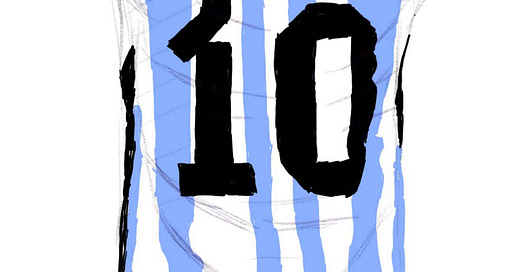



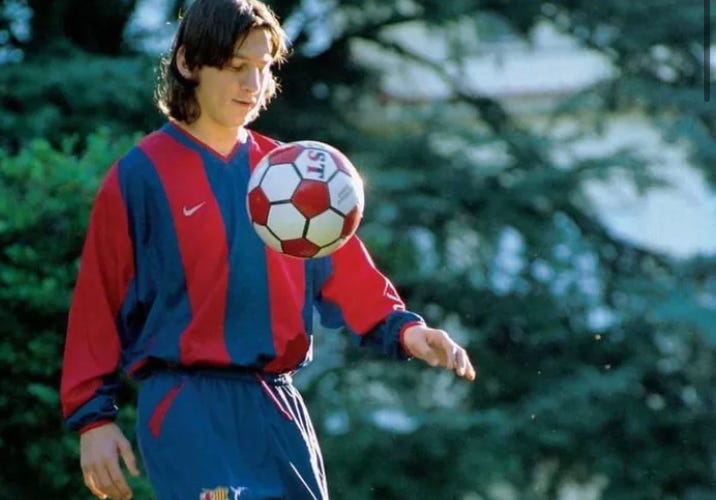
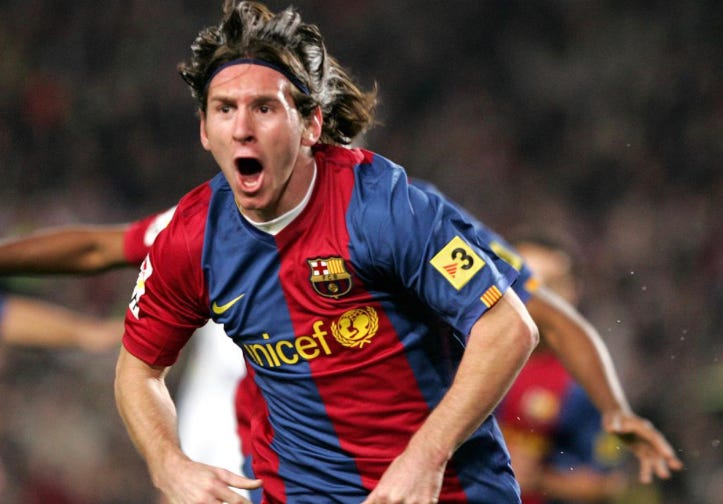
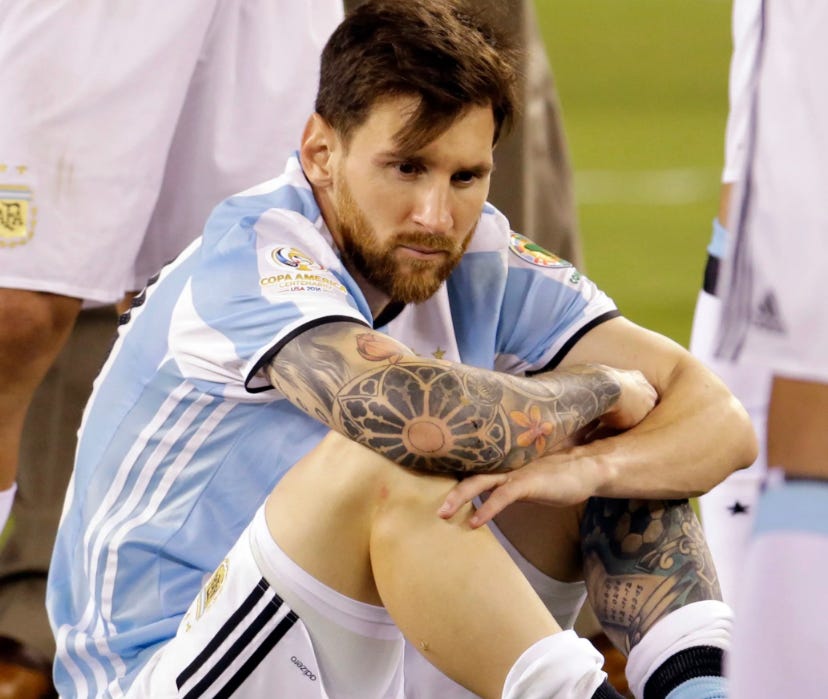
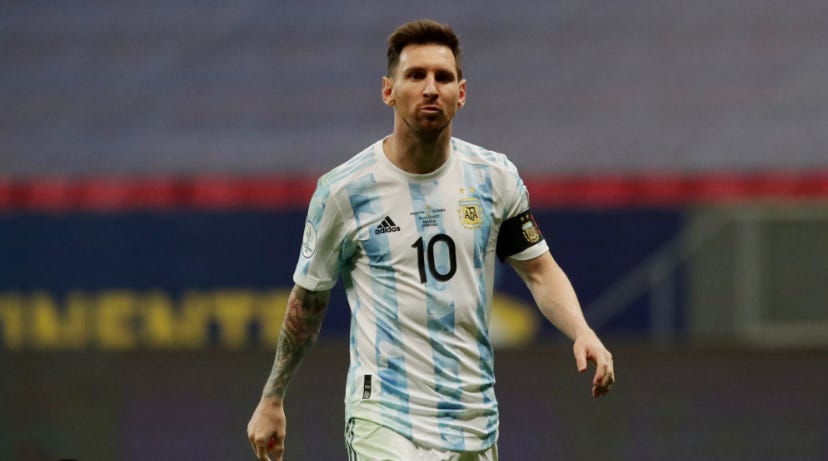
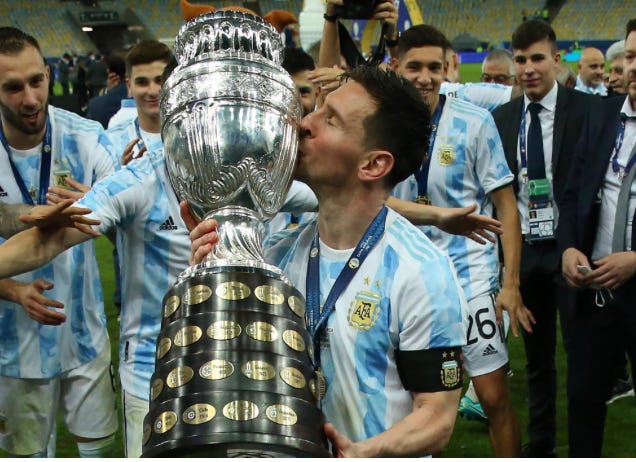
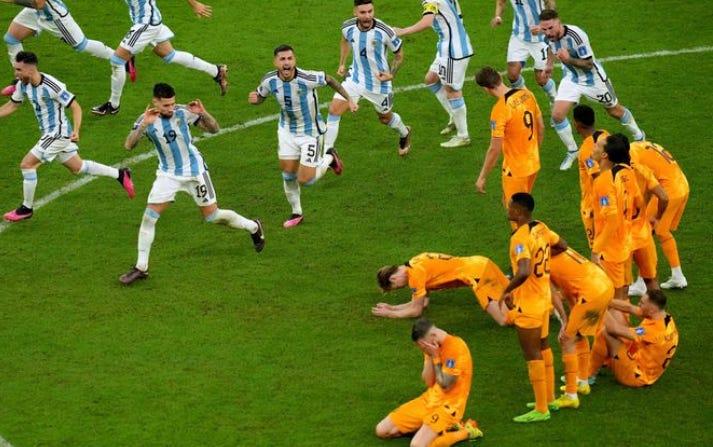
Thanks Sam. Yet again, another brilliant blog. I was completely oblivious to everything around me, including my wife, when reading it. I was so excited to read the next bits and look at the video clips. I loved your art work and video clip summary. What a player; such an inspiration. Thank you. Can't wait for the next World Cup. BFF